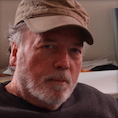It's been said that "infinity" is a concept beyond comprehension, and yet we have a word for it, and we can share it with others who understand what we mean. Obviously it can be comprehended, but (appropriately) only as a transcendent, not a specifiable, concept.
In contrast to conscious transcendence, the main difficulty in learning to interact with a computer "intelligence" is adapting to the need to the give it specific, literal instructions. A computer, a consummate object of scientific manufacture, is frustrating, and sometimes funny as Gracie Allen, for its inability to transcend the elements of communication. No addition of bytes, or registers, or layers of process can be expected to improve the interaction, except by invoking the virtual magic of a virtual infinity of technical complications whereby (presto! ) literal water turns to transcendent wine.
Consciousness can be NEGATIVE. By "negative" I don't mean its common association with being quarrelsome or pessimistic, although they do involve negativity. To be negative is to negate what is - to say "no", or "not", to refuse, to decide that something shouldn't exist, to imagine that something which doesn't exist should. And there is no likeness of negativity in the objects of science.
A chemical interaction is understood to be the product of what-is. Molecule A reacts with molecule B in a definite way, unless something external and accidental interferes. Genetic mutations, as understood in biology, are accidental modifications; they don't occur because an existing gene is not good enough, or because some alteration might be better. Whether a mutation is an improvement to an organism is irrelevant to its occurrence. But our abilities to critique, to imagine, to wish for what is-not express conscious, deliberate negations that elude the scientific world of cause-and-effect - just as they elude the world of supposed randomness and unpredictability proposed by quantum theory.
It's easy to say an insight like Einstein's theory of relativity - a radical negation of established beliefs - was caused by the performance of his most excellent network of neurons, and at a higher level, by various psychological, sociological, and historical factors. But a negative insight can only be reduced to a series of positive reactions by a determined refusal to negate implausibility. A theory is what it is, its inconsistencies are what they are, and for someone to say that a theory is not complete or not perfect or even wrong is to go beyond the convention, to refuse what is given, to negate and conceive something else in its place, which is to do something that's not just un-caused, but un-causable.
Art is, in general, the creation and experience of negation. Art is, remarkably, not what it is. To appreciate art is to negate its material. A painting is not (typically) just a cluster of colors, and not just an excellent technique. An artistic object has to be negated as-such to be experienced as art, to be grasped as a whole, as an intangible reference to something else, in order for it to evoke a thought or feeling that is transcendent of the immediate causation of color and recognition of expertise.
A computer can only deal with what is. An instruction may mean something negative to a programmer, but for the computer it is always a positive command or comparison, typically in the form of a composite of a number of "plus" and "minus" electrical charges. Even when a computer reports that something is not true, the report actually consists of a statement that something specific, somewhere specific, returns a specifically empty datum - "it is that it is not."
Consciousness can be WILLFUL. The age-old controversy of whether we are free or causally determined is an argument between extremes of interpretation. We are, evidently, neither entirely free nor completely determined by chains of cause-and-effect. To be willful is to be self-determined within limits, whether the limits are imposed from the environment without or from the personality within.
(Note: You can view every article as one long page if you sign up as an Advocate Member, or higher).





